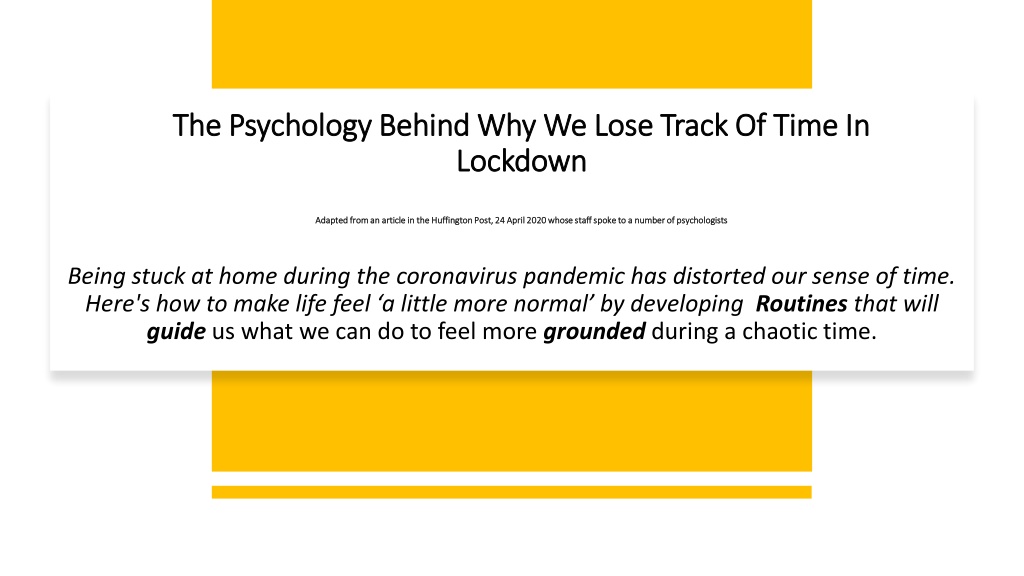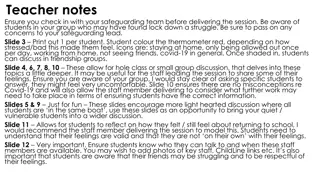Understanding Time Distortion in Lockdown: Psychology and Routines
Being stuck at home during the lockdown due to the pandemic can lead to a distortion of our sense of time. The loss of routine and structure in our daily lives can make all days feel the same. This article explores the psychological reasons behind this phenomenon and offers suggestions on how to create routines to regain a sense of normalcy and groundedness during chaotic times.
Download Presentation

Please find below an Image/Link to download the presentation.
The content on the website is provided AS IS for your information and personal use only. It may not be sold, licensed, or shared on other websites without obtaining consent from the author. Download presentation by click this link. If you encounter any issues during the download, it is possible that the publisher has removed the file from their server.
E N D
Presentation Transcript
The Psychology Behind Why We Lose Track Of Time In The Psychology Behind Why We Lose Track Of Time In Lockdown Lockdown Adapted from an article in the Huffington Post, 24 April 2020 whose staff spoke to a number of psychologists Adapted from an article in the Huffington Post, 24 April 2020 whose staff spoke to a number of psychologists Being stuck at home during the coronavirus pandemic has distorted our sense of time. Here's how to make life feel a little more normal by developing Routines that will guide us what we can do to feel more grounded during a chaotic time.
We are accustomed to a certain amount of structure to our days. Moving to working from home disrupts the structure. Anytime we have a big change in routine, this happens Your normal routine has gone out the window.
Why Life Feels Like A Blur Right Now Why Life Feels Like A Blur Right Now Before the lockdown, your week likely consisted of a handful of recurring activities, obligations and other plans. On Monday night you got together with your book club, on Wednesday you had standing lunch plans with a co-worker, on Thursday morning you went to spin class, Friday was date night, and on Saturday you got your nails done. Without these markers, the week has turned into an amorphous blob. You naturally did something different on work-out days, for example, like pack a gym bag, or wake up earlier, which made those days distinctive,
Without these distinctions, all the days feel the same, and it s hard to keep track There s no separation between work hours and downtime.
Working from home means that you no longer need to commute to and from the office a built-in ritual that helped delineate between on- and off-hours. Plus, physically being at the office signalled that you were in work mode, while being home meant it was time to relax. There s no There s no separation separation between work between work hours and hours and downtime. downtime. If you worked Monday through Friday at a certain location, then the weekends marked a change If you are now working from home and have nothing different that happens on the weekend, there is nothing to signify a change in days.
If you had a consistent work schedule prior to the outbreak, working well into the evening can throw off your sense of time. You do not have a standard end time to your workday like you used to, and this can make the timing of days feel confusing. You may be You may be working working more than more than before. before.
Youre spending more time looking at screens. You re spending more time looking at screens. Whether it s logging extra time on your work laptop, scrolling on your smartphone, binge- blue-light emitting devices blue-light emitting devices watching TV or playing video games all night, the increased exposure to these blue-light emitting devices can disrupt the body s internal biological clock, known as the circadian clock. circadian clock. And with much of our time spent indoors, we are limiting our exposure to natural light, which is an important external factor in resetting our circadian rhythms,
Your sleep schedule is out of sync. Your sleep schedule is out of sync. These days, you may find yourself staying up later at night because you don t have to get up as early in the morning What s more, we may be staying in bed a bit longer after waking up, since there may no longer be an external push to get up and get going, When your sleep schedule is all over the place, it also throws off your circadian rhythm, which contributes to you feeling out of sync. Not waking up at approximately the same time each day may also lead to distortions in how we experience time, since it leads to some days being a lot shorter or longer than others
Heres What To Do About It Here s What To Do About It
Create a new routine and stick to it. Create a new routine and stick to it. Add some structure to life in Lockdown by anchoring your days with certain rituals you do at the same time each day like having coffee at 8 a.m., prepping a healthy lunch at 1 p.m. and taking a walk at 6 p.m. after you ve finished the workday. Think of other activities in relation to these activities, For example, divide your day into before lunch and after lunch, and organise other activities into these smaller chunks of time. Instead of thinking, I need to do laundry today, think I need to do laundry before lunch. You can also tag activities to these anchoring activities, For example, after I take my daily walk around the neighbourhood, I start making dinner.
Then, to differentiate one day from the next, make new weekly traditions. That might be fish and chips for dinner on Tuesdays, a virtual yoga class on Thursdays and a Zoom wine night with friends on Fridays. Routines continue Routines continue
Plan specific fun activities you reserve for days off or things you only do on days off, Make your Make your workdays workdays different from different from your days off your days off I have work-related books that I used to read on the weekend, and now I have been strict in telling myself to only read them during the week
Find little ways to care for yourself every day. Maybe that s doing a guided meditation, taking a bath, writing in a journal or diving into a hobby like knitting. Set aside time Set aside time for self for self- -care. If possible, block out time each day to not work and do something enjoyable or focused on self-care, Keep this time consistent Monday through Friday. care.
Get outside every day. Get outside every day. If the weather permits, make sure you are getting exposure to sunlight during the day, This helps your body know what time it is. It also can help improve your mood.
Try a grounding exercise Try a grounding exercise. . When our days are as unstructured as they currently are, getting lost in this way can feel unnerving, In the moments you re feeling overwhelmed by the state of things or anxious about the future, grounding techniques can soothe you and bring you into the present moment. An exercise known as the 5-4-3-2-1 technique, takes you through the five senses. Pay attention to five things you can see around you, four things you can feel around you, three things you can hear, two things you can smell and one thing you can taste.
Be safe and Take care























